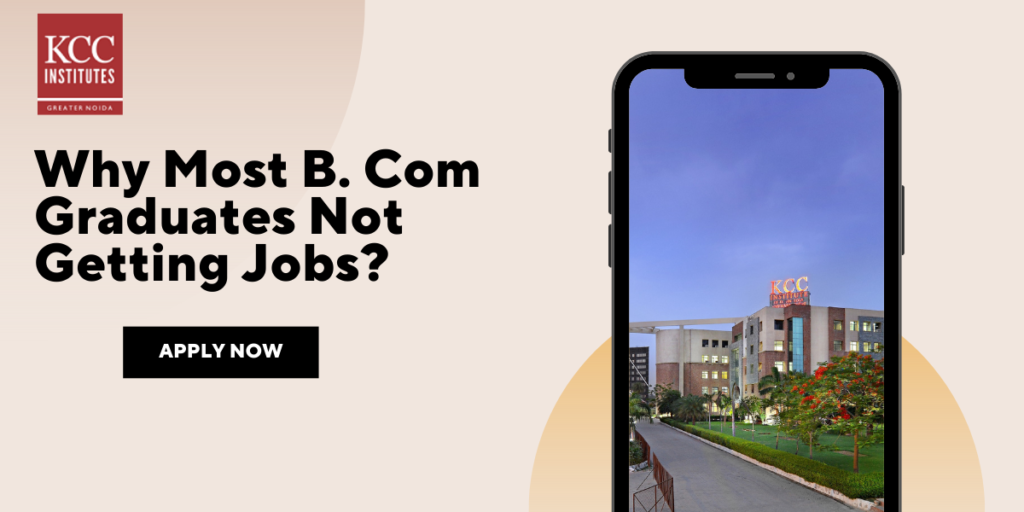
A graduate degree in B. Com is no longer sufficient to get you a solid job in today’s competitive labor market. To compete in today’s tough job market, students need more than just a B. Com degree. They also need the necessary knowledge and other skills.
It is usually regarded that acquiring a bachelor’s degree, particularly a B. Com degree in the commerce stream is a relatively decent career move and typically the minimum required for gaining a job. This is often true, but there are situations when it may be misleading. And here is why.
Stop putting off making career decisions
Most students enter the B. Com colleges without having any idea what it involves. Many commerce students falsely assume that getting a job can be possible after graduating from B. Com colleges only. The fewer career options you have, the longer you put off making this decision.
Missing practical knowledge
While there may be a large number of work prospects for B.Com graduates, the salary package and what position you hold in an organization ultimately determine success, and for those factors, a B.Com degree alone is insufficient. Companies now favor applicants with additional practical skill sets from top B. Com colleges. Most students are unaware of the choices for parallel courses that could increase the value of their B.Com degree.
Taking irrelevant courses
Several courses are taken by students after B. Com without a proper evaluation of their own skills and weaknesses. Peer pressure or personal interests may be to blame for this. But, it ultimately fails, leaving them with low-quality and underpaid occupations.
Automation in the Commerce Industry is Taking Away Jobs
It makes even harder to breathe for B. Com graduates with growing presence of automated software and AI systems in the banking and finance sector, further adding to the gruesome unemployment rates already exists in the commerce sector. Despite creating new job opportunities for tech experts in the commerce sector, these systems are actually designed to increase work productivity and cut the operational cost in the commerce sector. These technologies are taking away hundreds of jobs from those who still follow the old ways of keeping books. Less people required to carry out financial operations making it hard for B. Com degree holdersto get a job without an additional course to learn about these new techs.
Take auditing or taxation as an example. The amount of physical labor required to create these profiles is overtaken by machines powered by AI and ML. The majority of businesses have installed the machinery that would allow all of their books to be kept on computers, thus these duties not require the human mind to evaluate and strategize. So, as more companies open their doors and stringent record-keeping requirements are put in place, the demand for AI-backed software will only increase. These things are taking place in our society very rapidly, and your career future is undoubtedly is in great peril.
Concentrating exclusively on Academic Courses:
The commerce sector typically offers academic courses (like B.Com degree), professional courses (like CS, CA, etc.), and vocational courses (like Banking & Finance, etc.). Students typically just take academic courses and have little interest in learning practical skills. However those with practical skills and vocational training are given higher consideration by recruiters during campus hiring at B. Com colleges. Students would therefore be better served by pursuing a B.Com degree in addition to CS and Banking & Finance courses.
Thus, choosing to pursue a B. com degree with additional courses is preferable for students. In contrast to engineering, where students can only pursue an M. Tech, B.Com students have a wider range of alternatives, including an MBA, M.Com, CA, ICWA, and other degrees. But, a B. Com degree alone will not cut it. Students can become industry-ready and begin with better earnings and jobs if additional courses like CS and Banking & Finance are added to the B. Com curriculum.
Students who earn a B. Com Hons degree along with additional courses are better prepared for both employment and entrepreneurship, unlike those who pursue only a B. Com degree, which imparts only the basic understanding of commerce. Students gain sufficient commercial and financial understanding to enable them to function as employees or entrepreneurs.
BCom Hons allows students to specialize in a particular branch of commerce, which is far better as compared to simple B. Com degree when it comes to getting a job.
Statistics about B. Com employability
In India, the employability rate for B. Com graduates was about 43% in 2022, a slight improvement from 2021. A B. Com degree is frequently the minimal required for employment in the commerce stream. Reduced hiring by businesses has been mostly attributed to the slowdown in India’s economy.
Women are now graduating with more bachelor’s degrees than ever before in this nation. The employment rate for female commerce undergrads was over 70% in 2019.
Conclusion
Getting a B. Com degree is not rocket science. There are hundreds of good colleges in India where one can study B. Com and get a job. Becoming a B. Com graduate from top B. Com colleges like KCC Institute of Legal and Higher Education is the best way to ensure a prospective career in the commerce sector. We are a Grade “A” college of GGSIPU with a 40 acre campus equipped with all latest technologies and amenities. B. Com aspirants must clear CUET or IPU CET entrance exams to get an admission in KCC ILHE.
